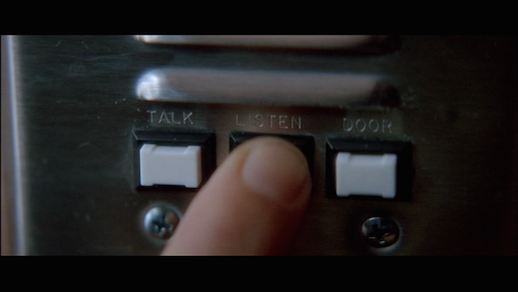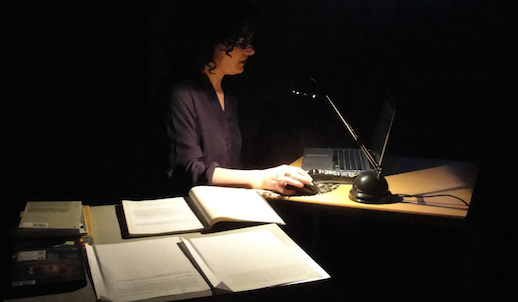Cheryl Tipp reports on a recent Points of Listening event, hosted by Daniela Cascella:
A couple of weeks ago, I knocked off early and headed over to the London College of Communication for the June instalment of a rather fabulous series that I’ve been keeping my eyes, and ears, on. Points of Listening is a monthly programme of sound-related events, in and around London, that seek to encourage and explore collective listening through discussion, soundwalks, listening sessions, film screenings and more. Co-convened by Salomé Voegelin and Mark Peter Wright, the series is now in full flow, with a great mixture of regulars and newbies making up each instalment. Connections forged through the act of collective listening are soon cemented during the post-event de-brief in a nearby boozer and a sense of community is beginning to take shape.
Back in April I attended my first PoL event, held at the Swedenborg Society, where musician and author David Toop enchanted his audience with an evening of mystical objects and ancestral sounds. That evening will remain branded in my memory as one of the most exciting and inspiring listening events I’ve ever experienced, reminding me that there is no defined formula when working with sound and presenting it to others. Anything goes as long as you have the knowledge and passion to back it up.
June’s event carried the tantalising title ‘Borders’ and described itself as an evening of listening and reading across the borders of sounds, film and words. Leading the session was writer and curator Daniela Cascella, whose beautiful prose was featured in last year’s field recording fanzine (note:Antidote #6 edited by Cheryl) . Taking our seats in a little room somewhere in the labyrinthine interior of the university, darkened by blackout curtains, I felt a brief tickle of panic as I realised that there was not enough light to write my notes. I needn’t have worried though for two weeks down the line, everything is still as clear and fresh as if it were yesterday.
With no playbill or track listing of any kind to refer to, we had no choice but to sit back and embrace the unknown. And boy were we in for a treat. The end sequence of Frederico Fellini’s ‘Roma’ kicked off the session, the roaring din of a motorcycle gang taking a night time drive along the streets of Rome smacking us full in the face. No dialogue or music, just the collective drone of dozens of engines creating the soundtrack. All visual stimulus was then removed as we plunged into audio only, the disembodied voices of a man and woman challenging our senses and painting pictures in our minds. The source of the audio was soon uncovered as we listened again to the dialogue, this time with the accompanying film extract in the form of the opening titles to Robert Aldrich’s apocalyptic tale ‘Kiss me Deadly’. Unsurprisingly, the scene that I had imagined, based entirely on the sound, bore no resemblance to the actual source. The lay of the land was completely different across this particular border.
The written word soon made its appearance, with Daniela reading extracts from favourite texts as well as from the book she is currently working on. One piece that resonated with me was a piece of text describing overheard conversations on a train. Too often I’m privy to the vacuous ramblings of my fellow commuters; perhaps if I tried to focus on the texture of their voices rather than the words themselves it might just become bearable.
As the evening progressed, we continued to traverse the realms of recorded sound, moving image and living readings. An extract from legendary Japanese director Akira Kurosawa’s 1957 film ‘Throne of Blood’ brought the evening to a close. This scene of a mysterious old man, caged and quietly singing to himself, sat in stark contrast to the seemingly endless freedom represented by Fellini’s motorcycle gang at the start of the evening. For them borders and boundaries were almost non-existent whereas the old man’s borders seemed to be dictated by others.
The de-illumination of the apple sign and the switching off of the tiny desk lamp told us that proceedings were coming to an end. With senses battered and brains brimming with questions and thoughts, we were brought back to Earth by Jerry Hunt’s eerie “Transform (stream): monopole for voice and device arrays”. This strange combination of whistling, breathing, bells and shakers added the final layer to what was an invigorating, inspiring and captivating journey. One again, the Points of Listening approach championed the idea that it’s ok to move away from preconceived formalities and really experiment with how to collectively engage with sound in new and interesting ways.
Cheryl Tipp is the wildlife sounds curator at the British Library and a regular contributor to Caught by the River. On Sunday 27 July Cheryl will be on our stage at Port Eliot festival leading a panel discussion in the art of field recording.

